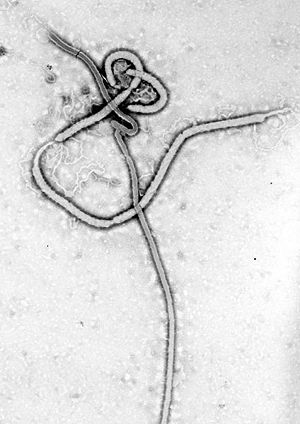Ebola virus: Difference between revisions
(Created page with '==Introduction== <br>To start your own paper: Type your page title into the Search box. (Be sure to spell correctly.) Press "Go." The site will offer you the opportunity to "Cre…') |
|||
| Line 2: | Line 2: | ||
<br>To start your own paper: Type your page title into the Search box. (Be sure to spell correctly.) Press "Go." The site will offer you the opportunity to "Create this page."<br>Next, use the "edit" tab to reveal the coded file of BIOL 191 Paper 2009. Select all and copy; paste into the edit window of your own page. (Do not try to edit the class page.)<br><br>Introduce the topic of your paper. What public health question do you raise? Whose health is affected; in what country or location? What disease organisms are involved?<br>Below are some sample codes that will be useful for your paper. <br> | <br>To start your own paper: Type your page title into the Search box. (Be sure to spell correctly.) Press "Go." The site will offer you the opportunity to "Create this page."<br>Next, use the "edit" tab to reveal the coded file of BIOL 191 Paper 2009. Select all and copy; paste into the edit window of your own page. (Do not try to edit the class page.)<br><br>Introduce the topic of your paper. What public health question do you raise? Whose health is affected; in what country or location? What disease organisms are involved?<br>Below are some sample codes that will be useful for your paper. <br> | ||
[[Image: | [[Image:Ebola pic.jpg|thumb|300px|right|Electron micrograph of the Ebola Zaire virus. This was the first photo ever taken of the virus, on 10/13/1976. By Dr. F.A. Murphy, now at U.C. Davis, then at the CDC.]] | ||
<br>To upload an image: Use "Upload File" (in margin at left)<br> | <br>To upload an image: Use "Upload File" (in margin at left)<br> | ||
To make the image appear, you need to embed image insertion code (see sample at right). The insertion code consists of: | To make the image appear, you need to embed image insertion code (see sample at right). The insertion code consists of: | ||
Revision as of 14:23, 19 November 2009
Introduction
To start your own paper: Type your page title into the Search box. (Be sure to spell correctly.) Press "Go." The site will offer you the opportunity to "Create this page."
Next, use the "edit" tab to reveal the coded file of BIOL 191 Paper 2009. Select all and copy; paste into the edit window of your own page. (Do not try to edit the class page.)
Introduce the topic of your paper. What public health question do you raise? Whose health is affected; in what country or location? What disease organisms are involved?
Below are some sample codes that will be useful for your paper.
To upload an image: Use "Upload File" (in margin at left)
To make the image appear, you need to embed image insertion code (see sample at right). The insertion code consists of:
Double brackets: [[
Filename: PHIL_1181_lores.jpg
Thumbnail status: |thumb|
Pixel size: |300px|
Placement on page: |right|
Legend/credit: Electron micrograph of the Ebola Zaire virus. This was the first photo ever taken of the virus, on 10/13/1976. By Dr. F.A. Murphy, now at U.C. Davis, then at the CDC.
Closed double brackets: ]]
Other examples:
Bold
Italic
Subscript: H2O
Superscript: Fe3+
Sample Section 1
Include some current research in each section.
Sample Section 2
Include some current research in each section.
Sample Section 3
Include some current research in each section.
Conclusion
Overall paper length should be approximately 2,000 to 2,500 words.
Include at least two data figures.
Use professional sources, including at least two research studies.
References
Edited by student of Joan Slonczewski for BIOL 191 Microbiology, 2009, Kenyon College.

